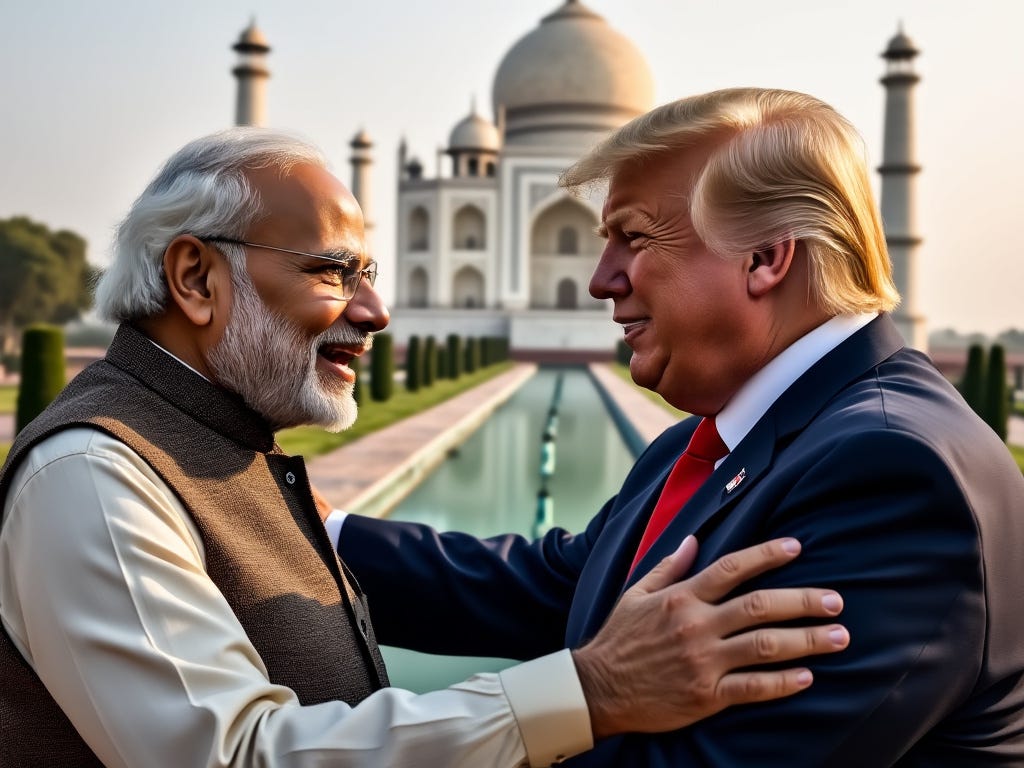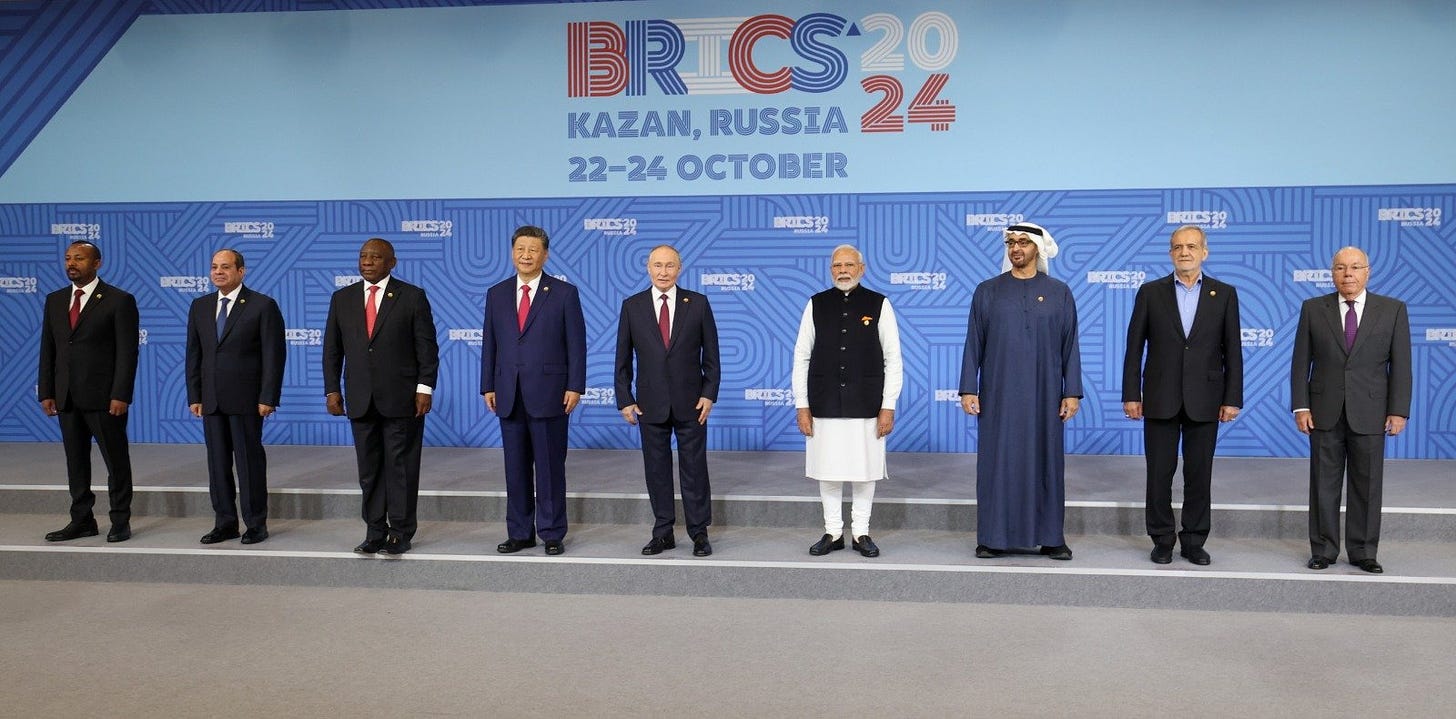Trump’s Return to the White House: How PM Modi Can Ace It
Now that ‘Abki Baar, Trump Sarkar’ is a reality, PM Modi can leverage his personal rapport with Donald Trump to India’s advantage, navigating strategic challenges and opening new avenues.
अबकी बार, ट्रम्प सरकार: A New Era for Indo-US Relations?
Foreign policy usually doesn’t shift drastically with a change in political leadership; however, Donald Trump's unique style and unconventional approach are likely to bring significant changes as he prepares to return to the White House in January, following his victory over Democratic candidate and incumbent Vice President Kamala Harris. Trump's personal rapport with Prime Minister Narendra Modi, combined with his unorthodox methods in tackling complex international issues, suggests that Indo-US relations could see notable positive transformations. Now that ‘अबकी बार, ट्रम्प सरकार’ is becoming a reality, PM Modi has a unique opportunity to leverage his personal relationship with Trump to India’s advantage, navigating strategic challenges and exploring new opportunities in areas such as immigration, defence cooperation, and India’s role within the expanded BRICS. This evolving dynamic could pave the way for a deeper, more resilient partnership between the two nations.
This article explores potential shifts in key areas, from immigration policies and strategic cooperation to India’s role within the expanded BRICS, examining how these aspects might evolve under a renewed Trump-Modi dynamic. We address these issues in a random order, concluding with a focus on India’s role in BRICS, which, in our opinion, could be a major sticking point, if not a stumbling block, in this evolving relationship.
Visa and Immigration Policies
Trump’s return could usher in a targeted approach to immigration, potentially advantageous for Indian professionals:
H-1B Visa Program: Trump may refine the H-1B visa framework to prioritise highly skilled workers, likely benefiting Indian tech professionals who are among the primary beneficiaries of the program.
Green Card and Citizenship: A merit-based immigration policy could expedite the path to permanent residency and citizenship for skilled Indian immigrants, in line with Trump's previously stated preference for high-skilled, merit-based migration.
Technology Transfer and Strategic Cooperation
Under a renewed Trump administration, strategic ties between the US and India, particularly to counterbalance China's influence, are likely to deepen:
Enhanced Defence Cooperation: Expanded arms sales and technology transfers are expected to strengthen India's military and technological capabilities, aligning both nations in their security objectives.
Quad Alliance: Trump may push for a broader agenda within the Quad, encouraging India to play a more active security role in the Indo-Pacific alongside the US, Japan, and Australia, thus fortifying the alliance against Chinese expansion.
Trade and Economic Relations
With Trump's "America First" agenda, economic relations with India may take on a more transactional nature:
Tariff Policies: Trump could introduce reciprocal tariffs; however, he might also offer preferential trade terms for Indian goods as a counterweight to China, supporting mutual economic interests.
"Make in India" Initiative: The Trump administration may encourage American companies to invest in India as an alternative manufacturing hub, in alignment with Modi’s “Make in India” initiative, thereby fostering a robust trade partnership.
Indian Diaspora and Diplomatic Relations
The Trump administration might continue to strengthen ties with the Indian-American community, a demographic that has gained increasing political and economic influence:
Key Appointments: More Indian-origin professionals may be appointed to prominent roles within the Trump administration, signalling increased representation and influence for the diaspora.
Diplomatic Engagements: Given Trump's personal rapport with Modi, he may take a more hands-on approach in resolving specific diplomatic issues that impact India, such as the Gurpatwant Singh Pannun case, fostering smoother bilateral ties.
Intelligence Sharing and Regional Security
Increased intelligence sharing and cooperation on regional security are anticipated, with a focus on shared threats in South Asia:
Actionable Intelligence: Enhanced intelligence collaboration concerning anti-India elements operating from Pakistan, Myanmar, and Bangladesh could be on the cards, underscoring a shared commitment to security.
Regional Security: Trump’s administration may support India’s counter-terrorism and counter-insurgency efforts in the region, reinforcing India’s role as a stabilising force in South Asia.
Russia-India Relations
India's careful stance on Russia, particularly concerning energy imports and the Ukraine conflict, will require nuanced diplomacy with the Trump administration:
Balancing Act: Modi and his diplomatic team may need to communicate India’s position on Russia to the US, balancing strategic autonomy with sensitivity to American geopolitical concerns.
Energy Security: India may need to diversify its energy imports to align with US interests while preserving its energy security. This diplomatic balancing will be crucial given India's current dependence on Russian energy.
India’s Role in Expanded BRICS
India’s involvement in the expanded BRICS, now including new members like Saudi Arabia, presents a complex equation for US-India relations:
Moderating Influence: The US might expect India to play a moderating role within BRICS, mitigating anti-Western rhetoric from members such as Russia and Iran.
Economic Focus: Washington could encourage India to steer BRICS towards economic cooperation and development, focusing on trade and growth rather than geopolitical friction.
Energy Alliances: Saudi Arabia’s inclusion in BRICS raises potential concerns for the US regarding energy alliances. The US may look to India to promote transparency and market-oriented policies within the group.
Strategic Assurances: The US may seek assurances from India that its role in BRICS won’t compromise the growing strategic partnership with the US, particularly in areas such as defence cooperation and countering China's influence.
Balancing Role: As part of BRICS, India could act as a bridge, preventing the bloc from becoming overtly anti-Western while advocating for global governance reforms that align with shared US-India interests.
The Musk Factor: Pressure to Mount on India for Tesla and Starlink
Elon Musk’s significant contributions to Trump's campaign, both financially and strategically, signal his probable active involvement in shaping the Trump administration's policy priorities. This partnership is likely to add another layer of complexity to Indo-US relations, as India could face mounting pressure to accommodate Musk's ambitious projects, such as Tesla manufacturing and Starlink satellite internet services. With Musk’s vocal support and financial backing, the Trump administration may push for quicker approvals for Tesla's entry into India, particularly for manufacturing plants and the introduction of advanced technologies, including driverless cars on Indian roads.
Furthermore, Starlink’s satellite internet services, crucial to Musk's broader vision, bring regulatory challenges, especially concerning spectrum allocation. While Musk may prefer an allotment-based model to expedite rollout, Indian regulatory norms and corporate stakeholders, particularly Reliance Jio, favour spectrum auctions to ensure competitive pricing and fair play. The involvement of Trump’s administration in favour of Starlink could intensify the debate, placing Modi’s government in a delicate position of balancing national interests with the economic benefits of advanced connectivity and high-value manufacturing. Navigating these demands without compromising India’s regulatory autonomy and addressing the concerns of domestic telecom giants like Reliance will require deft diplomacy and strategic foresight.
Summing Up and Looking Forward
The potential for strengthened Indo-US ties under a Trump presidency is considerable, given the personal rapport between Trump and Modi, which promises a solid foundation for direct communication and pragmatic issue resolution. Yet, India will need to balance its strategic autonomy with the expectations of a renewed US partnership, especially as diplomatic and intelligence collaboration become pivotal to address shared concerns. A close synergy between the two nations’ agencies will be essential to facilitate effective, high-level interactions on critical matters, particularly as both nations face evolving regional and global challenges.
Adding complexity to this relationship is India’s expanded role in BRICS, which requires deft diplomacy to harmonise its interests with both the US and BRICS nations. This role presents India with a unique chance to act as a global bridge, promoting cooperation across diverse blocs. However, Elon Musk's growing influence within the Trump administration may add pressures on India to open its markets to advanced technologies like Tesla and Starlink, despite regulatory sensitivities and domestic opposition. Balancing BRICS commitments with these emerging demands—particularly as Musk's ventures could benefit from Trump’s backing—will test India’s diplomatic finesse. Cautious optimism prevails: the Modi-Trump camaraderie could serve as a cornerstone for stability, provided India skillfully navigates Musk-related pressures, adheres to its regulatory framework, and leverages its position within BRICS.







…….despite a comprehensive study of Indo-US relationship post Donald Trump take-over, we must remember that lot of waters have flown down various rivers in India as well as USA since 2020, painting of “Ab ke baar Trump Sarkar “ has faded to a large extent. Indian Govt is fighting to re-establish its credentials post Pannun attempt allegations. The road ahead is bumpy…….